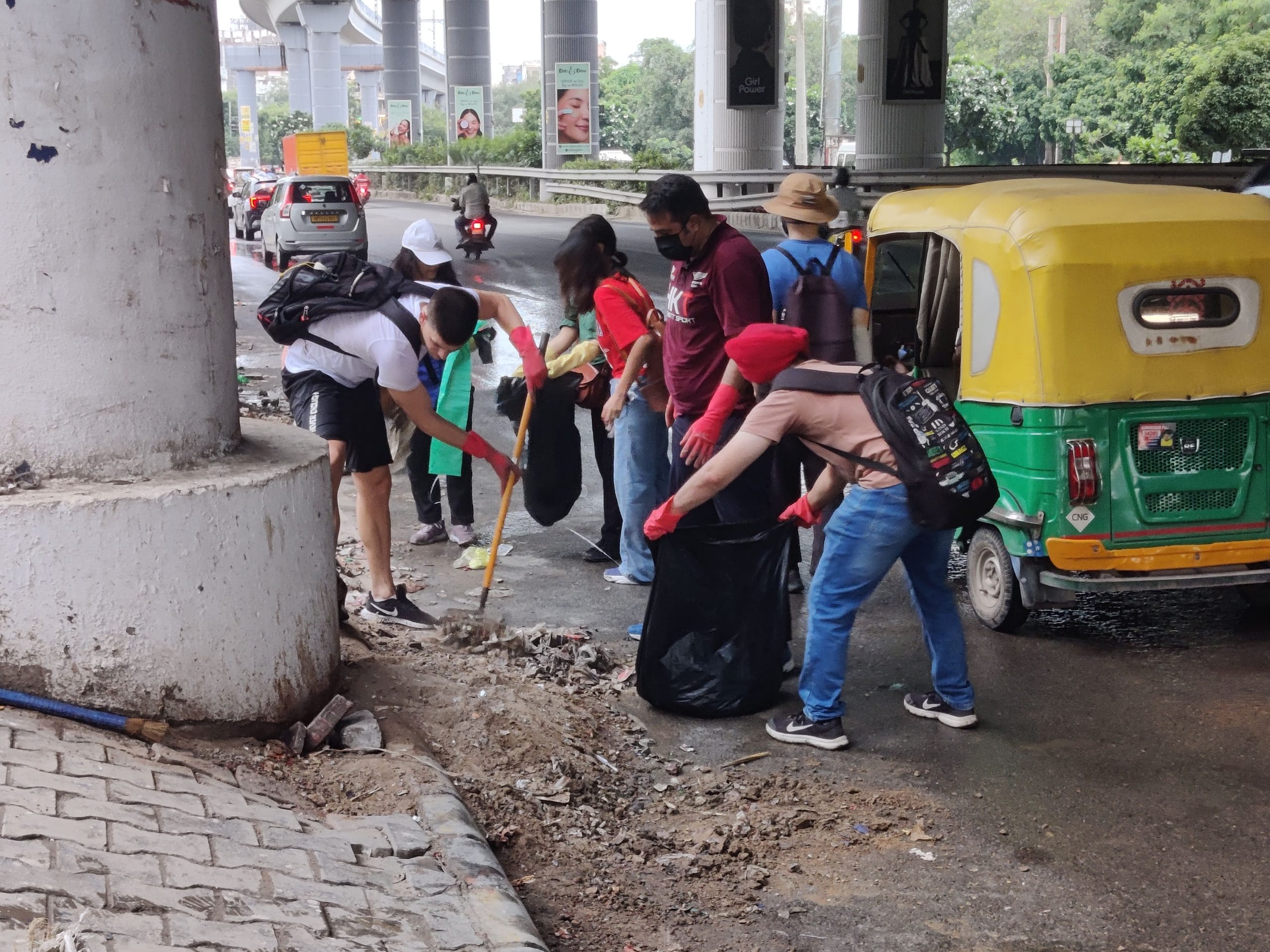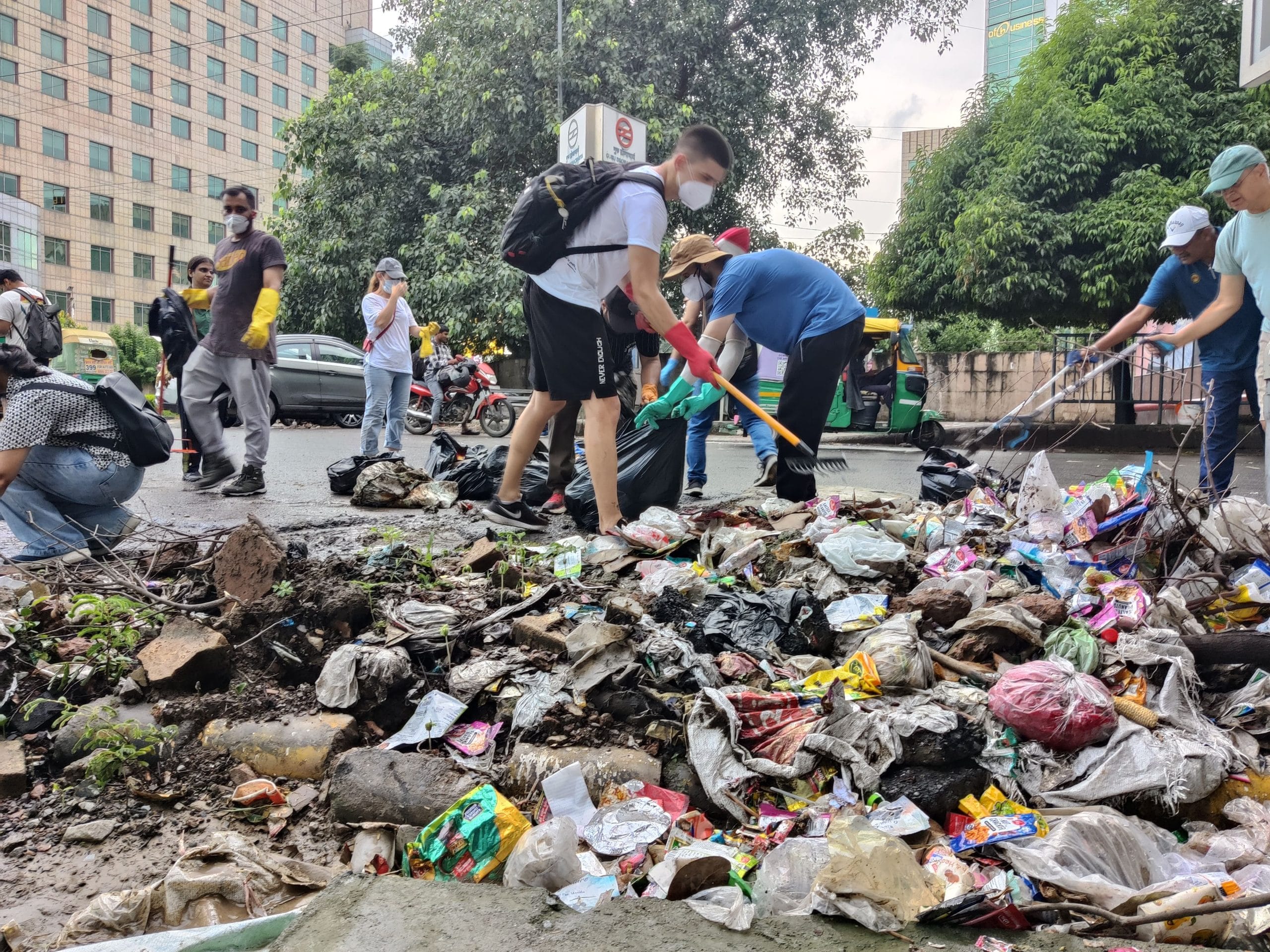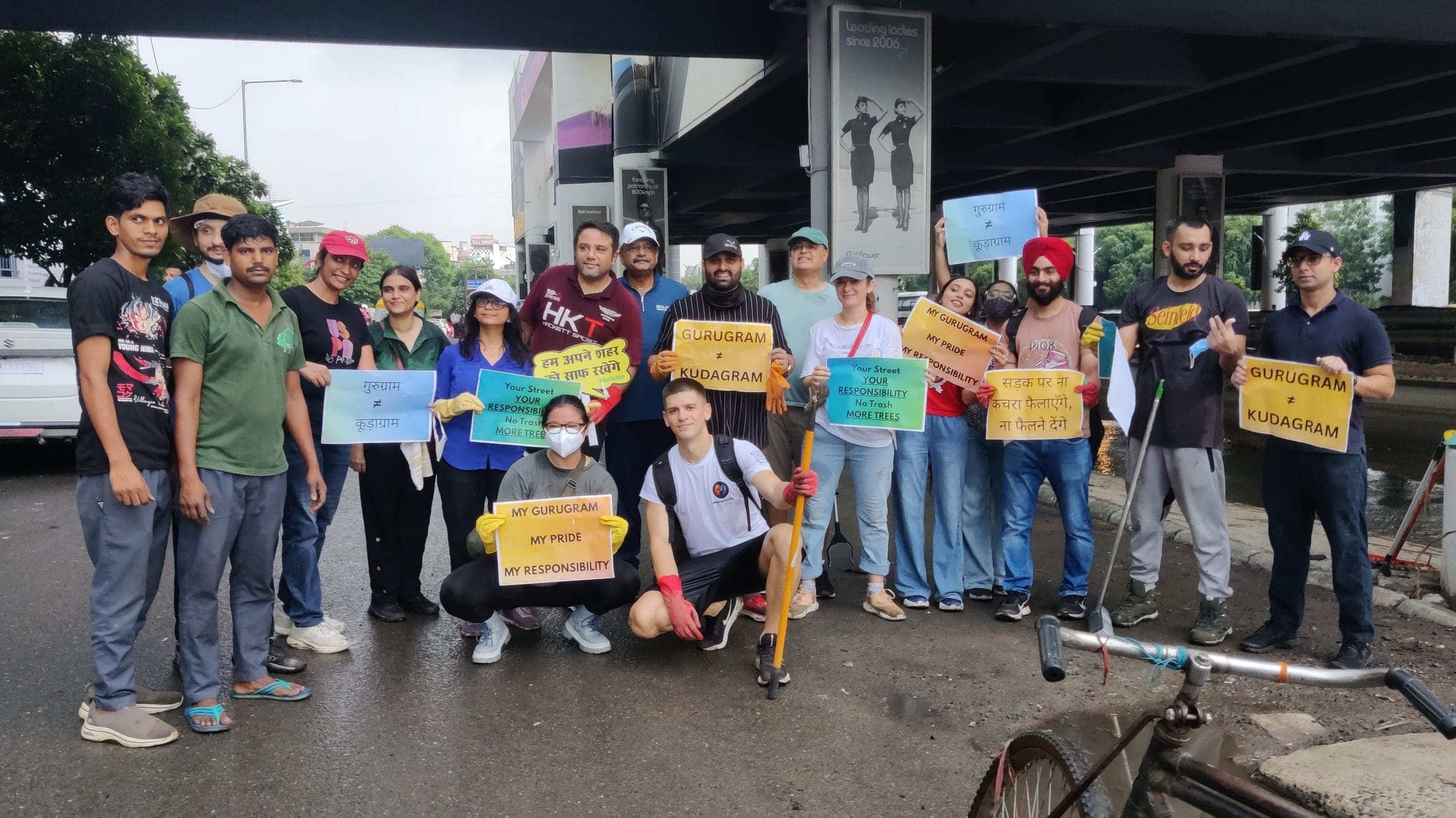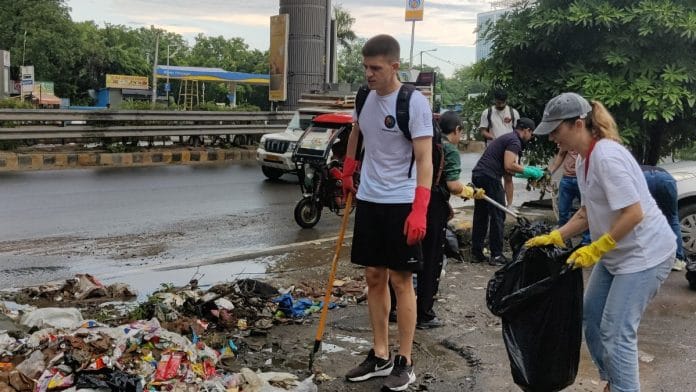Gurugram: It took a Serbian man in Gurugram to ask the most important question these days as he sets out to clean the streets every Sunday.
Lazar Jankovic is not asking why Gurugram is full of garbage piles. His question is more piercing.
“People should stop asking me why I’m cleaning the streets and posting about it. They should start asking themselves why they’re not doing it in the places where they live and commute every day,” said Jankovic, a 32-year-old Serbian yoga practitioner, pointing to plastic bags clogging a gutter meant to carry rainwater, resulting in waterlogging on the path.
He is holding up a mirror. His weekly Gurugram cleanliness drive isn’t just about why Indian cities are dirty. It is raising fundamental questions about Indian social behavior.
“It was never planned. I just clean the place where I live. I only wanted to send a message to people that India is so beautiful, it doesn’t deserve to be littered,” said Jankovic.
Joining the cause
As the group began cleaning the area in front gate no.1 of Guru Dronacharya Metro Station, rickshaws stopped and passengers got down. They didn’t just walk away — many stopped to ask what was happening, some took photos, and others recorded videos. People like Rakesh, who was heading home after a long day of labour, joined the group.
Soon, a vendor from Shiv Chaat Bhandar also joined the team, helping out until his customers began looking for him.

Jankovic was the centre of attention the whole time. Dressed in a white T-shirt and black shorts, with a backpack and bright red gloves, he naturally stood out as he led the team. He used his hands to lift large rocks and swept the area with a broom, humming the Veer Zaara song Aisa Desh Hai Mera in his accented Hindi.
After more than three hours of cleaning, Jankovic even danced in the rain.
“Kya sahi banda hai yaar yeh!” someone from the group said with a smile.
Also read: An IAS officer brought down Lucknow’s garbage mountains. He’s ‘kalyug ka Hanuman’
Ek Din, Ek Gully
Red plastic gloves, black rubber boots, and holding a garbage picker in one hand. This get-up of Jankovic has become a familiar sight on the streets of Gurugram and across social media. What was initially meant to be a seven-day clean-up campaign, Ek Din, Ek Gully (One Day, One Street), leading up to Independence Day, has now evolved into an ongoing mission.
Jankovic came to India in 2018 for a modeling assignment and lived for more than five years in Bengaluru training to become a yoga instructor, which also involved travelling to different cities. In 2024, he moved to Gurugram for his yoga sessions. But Gurugram wasn’t the first place where he began cleaning the streets and collecting garbage from neighborhoods. He started his clean-up efforts wherever he lived — beginning in Bengaluru, continuing in Tamil Nadu, and even collecting garbage during a trek in Rishikesh.

However, it was his recent videos from Old Delhi, India Gate, and now the daily clean–up drives in the gullies of Gurugram that caught the attention of people on social media. Many not only appreciated his efforts but also began joining him on his next gully campaigns.
It’s not a mission, it’s a duty
– Lazar Jankovic
At every location Jankovic chooses to clean, a new group of volunteers joins him, turning the one-man initiative into a growing movement of community-led action.
“I started by cleaning a place that was just a dump of garbage, with a few cows standing beside me. Now, every time I clean, I have a new team with me,” he said.
Gurugram’s struggle with garbage
Gadi wala aaya ghar se kachra nikaal, the popular jingle associated with waste collection in neighborhoods, has become something of an anthem for Jankovic’s cleanliness mission. Humming the tune with a broom in hand, he walks through alleys and streets, picking up discarded wrappers, plastic bottles, and other bits of litter filling a number of black color garbage bags. He frequently sings Hindi Bollywood patriotic songs as well, including the very popular Mere Desh Ki Dharti from Upkar (1967).
“It’s not a mission, it’s a duty,” he said.
A yoga practitioner, Jankovic travels extensively across India, both for work and his passion for exploration. But unlike most travellers, his journeys come with a purpose. Wherever he goes, be it city streets, mountain trails or forest paths, he carries a broom, gloves, and garbage bags along with his backpack, cleaning the areas he passes through.
In February this year, during his trek to the Velliangiri Hills, a popular pilgrimage destination in Tamil Nadu, Jankovic cleaned the trail and surrounding areas. For him, travel is not just about discovering new places, but also about respecting and preserving them.
“Imagine if every street you walked through was clean and garbage-free,” he said. “But that won’t happen just by imagining, it will happen by doing.”
Jankovic’s Instagram handle, with the bio “Serbian on a journey of cleaning India”, had only 36 posts. But after his clean-up drives went viral, he received hundreds of friend requests and direct messages. Most of the messages were filled with appreciation for his inspiring work, with many people eager to know his next cleanliness drive location so they could join him in his mission.
It’s not a proud moment, but a shame that someone from outside is teaching us cleanliness and cleaning our spaces
– Sankriti Garg
As soon as the videos began to gain traction on social media platforms, many pledged to clean their own surroundings, while others expressed a sense of shame, questioning why it took a foreigner to lead such a movement aimed at improving India.
“It’s not a proud moment, but a shame that someone from outside is teaching us cleanliness and cleaning our spaces,” said 26-year-old Sankriti Garg, who joined Jankovic during one of his clean-up drives near the Guru Dronacharya Metro Station.

Gurugram’s struggle with garbage is nothing new, it has long been the talk of the town. Beyond Gurugram’s flashy and modern skyline, waste is scattered across city streets and dumped in front of high-rise buildings.
Despite being a financial and tech hub, and home to global giants like Google, Microsoft, Wipro, Deloitte, TCS, and HCL Technologies, Gurugram continues to grapple with poor waste disposal and management. In the absence of effective action by authorities, both concerned citizens and foreigners like Jankovic have stepped in to clean the city themselves.
“Even if we, as citizens, clean our surroundings and the city, where will we dispose of the garbage? At some point, the authorities have to step up and do their job,” said Ashish Arora, a resident of Sector 55, Gurugram.
Also read: Hyderabad’s HYDRAA is using history to build a livable city of future. In Singham style
Not a one-man mission anymore
A group of around 10 people, who had never met in person but were connected through social media, gathered near the Guru Dronacharya Metro Station at exactly 4 pm. Their mission: to clean up a 100-metre stretch around the station. By the end of the drive, they had collected around 15 bags full of garbage, which were later disposed of at the nearest waste dumping site managed by the municipal corporation.
Alongside Gurugram residents and Jankovic, a French national named Matilda, who has been living in Gurugram for the past two years, also joined the Sunday cleanliness drive. She emphasised the importance of individual responsibility in maintaining cleanliness, urging people to not only avoid littering but also stop others from doing so.

“The mindset of ‘my garbage, my responsibility’ can truly bring about change in India,” said Matilda, as she politely requested a nearby tea vendor to use a dustbin and encourage his customers to do the same. She also urged local food cart vendors not to litter or allow others to undo the cleaning efforts.
Under his initiative Ek Din, Ek Gully, Jankovic aimed to clean at least one street, park, or public area in Gurugram every day. Inspired by his work, local residents have begun organising similar clean-up drives every Sunday at metro stations, parks, and other public spaces.
“No other country worships land the way we Indians do. We call it mother and god and yet, it’s people from other countries who are helping us clean our own motherland,” said 33-year-old software engineer Pawanpreet Kaur. “There can’t be a stronger wake-up call for both the authorities and the citizens.”
In one of the videos on his Instagram page, Jankovic cleans a pile of garbage outside what appears to be a residential building. He points toward a house and shows his disappointment at people not even cleaning their surroundings.
“If it is outside the house people don’t bother,” he said. “Stop pointing fingers and blaming others. Take action and you’ll see the difference,” he added, while picking up water bottles and plastic waste from the street.
Streets to mountains
Jankovic lives a simple and private life. His days begin with meditation and exercise, after which he attends yoga sessions. Cleaning, however, is not something he began in India; it has been a part of his life since his early days in Serbia. When he visits his hometown once a year, he still makes time to clean the streets and water the plants in his neighborhood.
Jankovic makes it clear that he is not associated with any NGO or working under any government authority. For him, cleanliness is simply a personal responsibility, a way to take care of his home, no matter where he lives. He doesn’t ask people to join him. Instead, he urges everyone to take initiative and start cleaning their own surroundings.
“India has everything and people do come together in times of crisis,” he said. “But when it comes to something as basic as cleanliness, if it’s outside their home, they often think it’s not their problem. Changing that mindset is the key.”
When asked about the cleaned areas getting littered again, Jankovic responded, “Just because it will get dirty again doesn’t mean we should stop cleaning. These small efforts, when repeated, lead to big change.”
His next stop isn’t limited to just another street, it includes the Himalayas as well. Jankovic said he plans to visit the Himalayas soon, and if he comes across garbage or litter on his journey, he won’t hesitate cleaning up there too.
Addressing one of the most frequent questions he receives, Jankovic replied with a familiar phrase he often repeats: “Don’t ask me why – ask yourself, why not?” And then added, “If we don’t do it, who will?”
(Edited by Aamaan Alam Khan)






